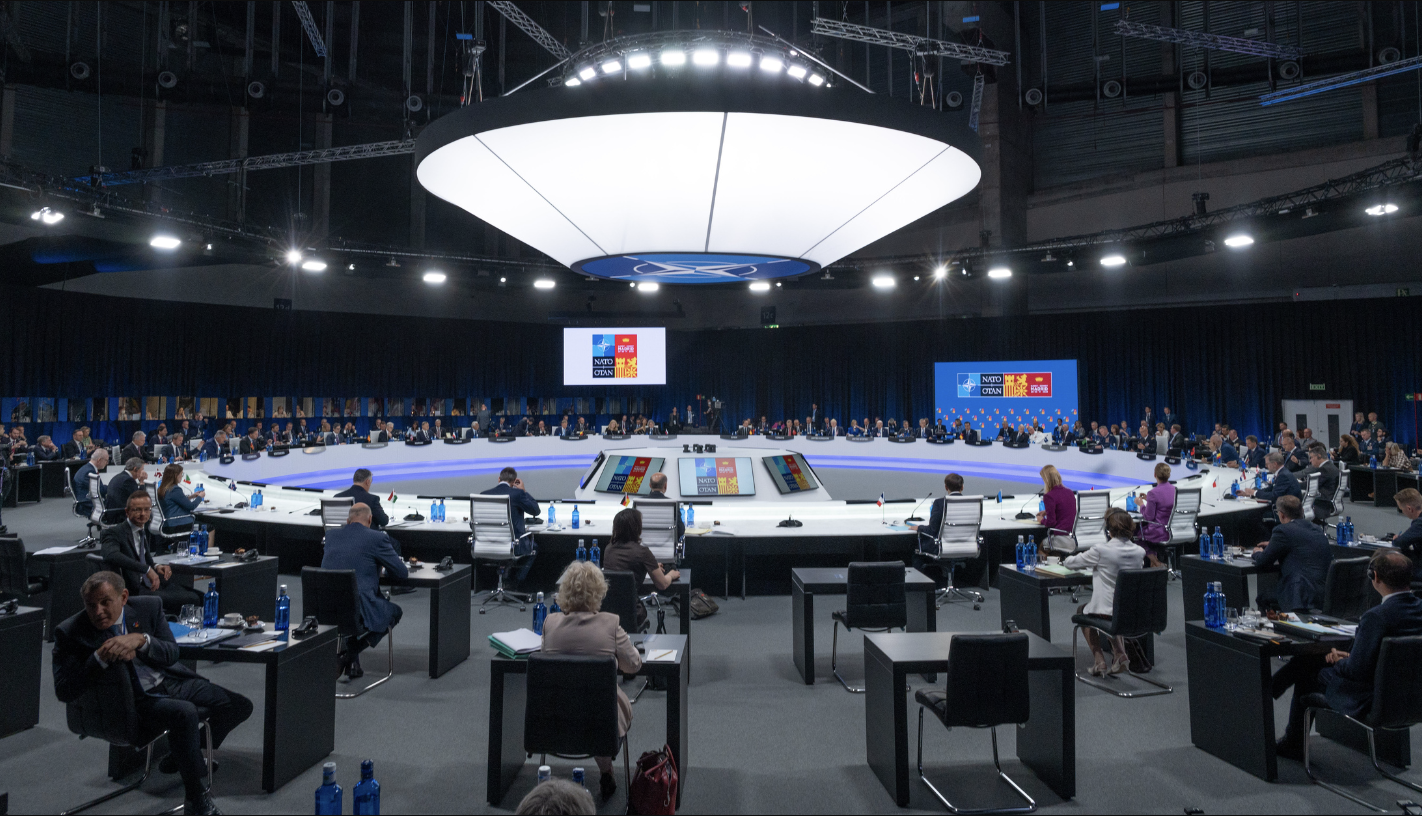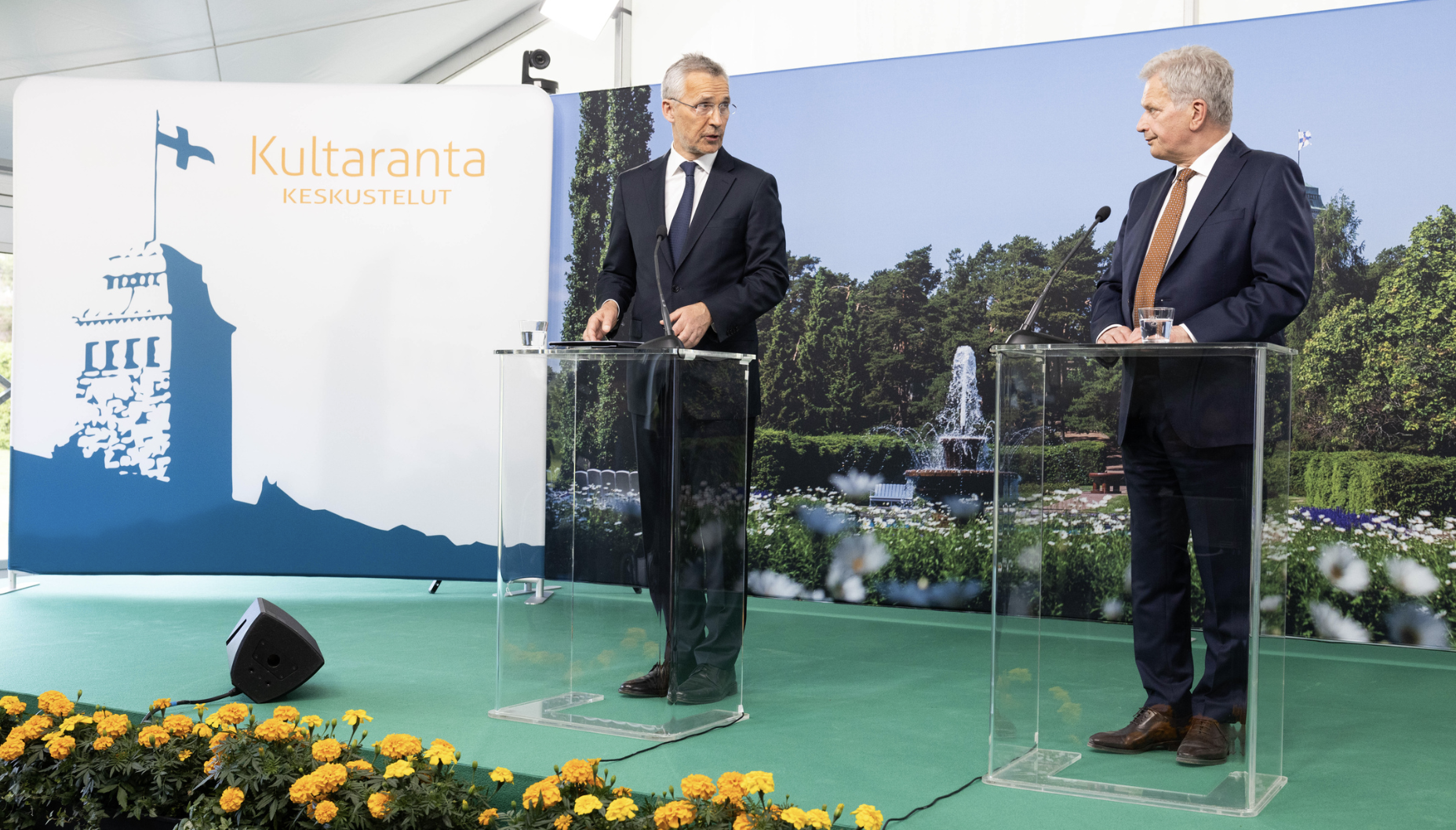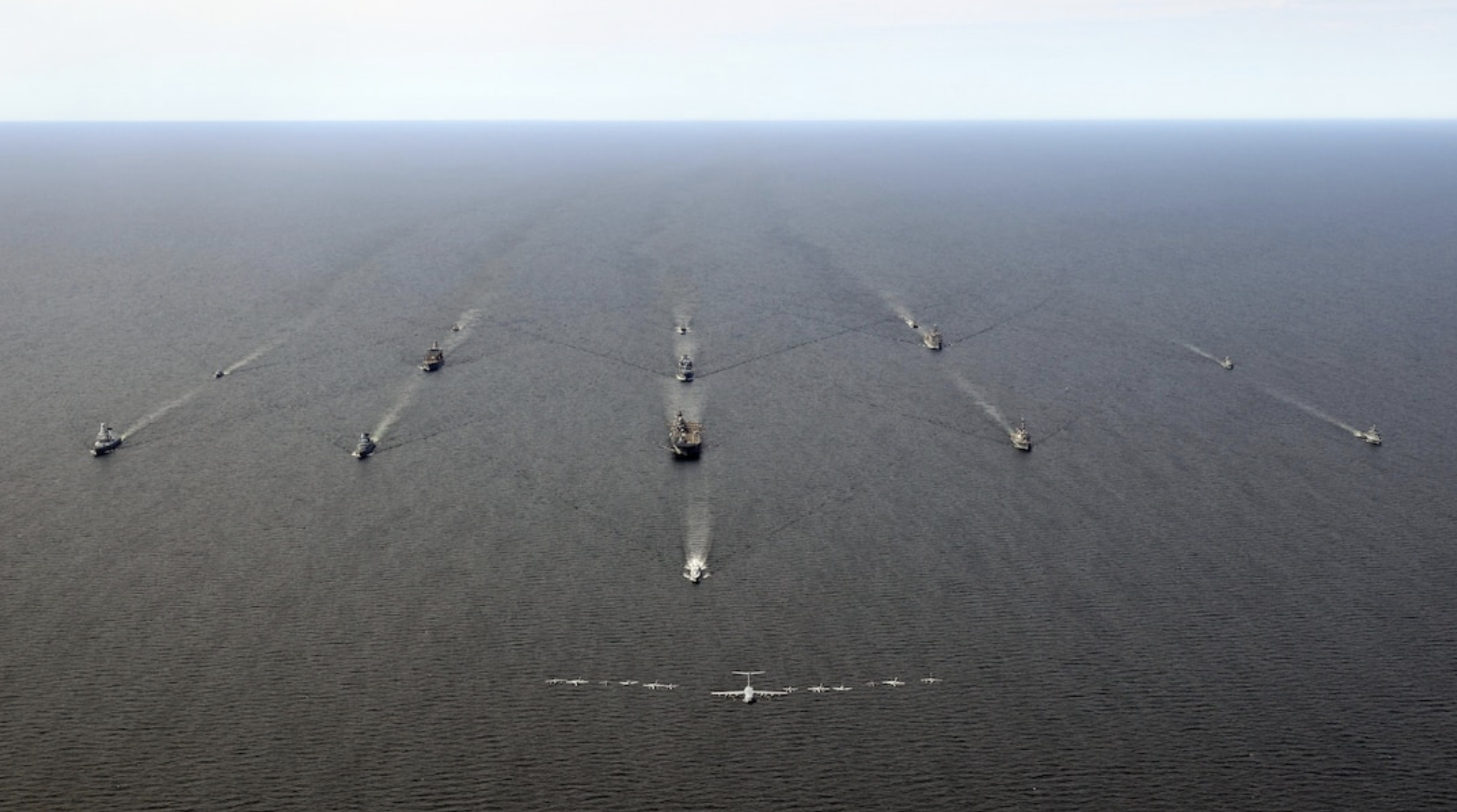
Heads of state and heads of government of NATO member and partner countries meet in Madrid, Spain, on June 29, 2022. NATO PHOTO
NATO formally invited Finland and Sweden to become members June 29, declaring that joining the alliance will make both nations safer, NATO stronger, and the Euro-Atlantic area more secure. “The security of Finland and Sweden is of direct importance to the Alliance, including during the accession process,” according to a statement issued by the Heads of State and Government of the North Atlantic Alliance at a summit in Madrid.
Is this a good move or a bad one?
Two U.S. Naval War College faculty members — Lindsay P. Cohn, Ph.D., and Andrew L. Stigler, Ph.D. — both associate professors in the Department of National Security Affairs, accepted our invitation to debate the merits of this timely question here. Views expressed are their own and not those of any U.S. government department or agency.

NATO Secretary Jens Stoltenberg, left, joins Finnish President Sauli Niinistö, right, for a press conference during a visit to Kultaranta, Finland, on June 12, 2022. PHOTO BY NATO
YES: A Net Positive for NATO
By Lindsay P. Cohn, Ph.D., Associate Professor, National Security Affairs, U.S. Naval War College
Finland has long relied on neutrality for its security. After the Soviet Union dissolved, it chose to join the European Union but not NATO, believing it safer to avoid entanglement with NATO politics and deal pragmatically with Russia. But now President Vladimir Putin’s behavior indicates this strategy is no longer reliable. After Finland (and Sweden) delivered their formal requests for NATO membership, most NATO member countries signaled their support.
But is it a good move for the alliance? Yes. Mostly.
Some are concerned that expanding NATO would provoke Russia into more aggression. Putin and his apologists argue Russia has legitimate security concerns that would be exacerbated to an intolerable degree by further NATO expansion.
But even if this is true, Russia clearly cannot afford to open another conventional front against a very capable enemy any time soon.
What about once the alliance’s commitment to Ukraine has weakened and Russian artillery has pounded Ukraine to a peace agreement? Would Putin attack Finland later, after NATO accession?
It’s possible, but seems unlikely. The Finns are in far better defensive shape than the Ukrainians were at the beginning of this most recent invasion. If they were a NATO member, assistance would be more aggressive than it has been to Ukraine. And a war with Finland would be significantly more painful and destructive to Russia than the war with Ukraine. While that pain alone is unlikely to cause popular uprising (most of those willing to protest have already been arrested), it may put sufficient strain on the military and security forces to cause military failure, and it would continue to hurt their economy.
In my view, Putin is not actually concerned that NATO poses a security threat to Russia, but he resents that NATO is encroaching on his desired sphere of influence. Putin would prefer a neutral Finland. But he is unlikely to believe he could bring Finland under his influence the way he could with Belarus, Georgia, or Ukraine. In short, he already viewed Finland as unlikely to belong to his sphere, and was already unlikely to try military domination. Accession simply lowers that chance more.
But might Finland’s accession provoke war somewhere else?
Putin could certainly use it as a pretext to, e.g., further militarize the Arctic or pressure European energy supplies. But these are things he is likely to do (or not) anyway, based on his view of his interests. And NATO *with* Finland (and Sweden) is better able to respond to some of those eventualities.
Some fear having Finland in NATO risks the likelihood of the U.S. being dragged into an unnecessary war. They say adding Finland does not increase the alliance’s military capabilities sufficiently to justify the increased vulnerability.
However, the U.S. tends to be the one entangling other NATO members in wars, not the other way around. The U.S. gets involved where it believes it has interests, not because its allies force it to. If Russia ever did attack Finland, the U.S. would likely send significant support to Finland whether it was in NATO or not, because Finland is in the EU and the success of the EU is a major U.S. interest in Europe. Bringing Finland into NATO does not increase the alliance’s vulnerability, only its capability.
The U.S. tends to be the one entangling other NATO members in wars, not the other way around.
The Finnish military may be focused on a homeland defense mission, but it is a well-trained, well-equipped, largely NATO-interoperable force, and could contribute significantly to the defense of both the Arctic and the Baltic, as well as out-of-area operations.
The real concern here is the message all this sends to Russia and Ukraine. Ukraine has made its wish to join NATO and/or the EU very clear. For NATO to welcome Finland (and Sweden) in, specifically on the grounds that doing so will secure those states against Russian aggression — while indicating to Ukraine that membership is off the table — would be an explicit admission that NATO is willing to sacrifice Ukraine to Putin’s sphere of influence. Sending that message while Ukraine is still fighting for its existence is demoralizing in the extreme, and energizing for Putin.
The significance of this decision is much larger than just the consequences for Finland or Ukraine. The U.S. is trying to determine what role it wants to play in a multipolar world. Acknowledging a Russian sphere makes it difficult not to acknowledge a Chinese sphere, and that may signal a broader US retreat from the world.
Finland would bring a lot to NATO without significantly increased risk to the alliance. But the U.S. and Europe must be careful with their messaging, and at least leave the door open to Ukraine. Otherwise, the world of great power spheres of influence has not only been accepted, but the lines have been drawn.
Follow Dr. Lindsay P. Cohn on Twitter at @lindsaypcohn.
NO: NATO Should Slow Rush to Join
By Andrew L. Stigler, Ph.D., Associate Professor, National Security Affairs, U.S. Naval War College
Russia’s unprovoked and brutal invasion of Ukraine has prompted a transformation in defense thinking among Finnish strategists and national security elites. Now less wary of angering Russia, Helsinki moved with lightning speed to seek membership in NATO. The proposal was popular in Finland.
But like many elements of NATO’s post-Cold War expansion, the addition of Finland and Sweden to the alliance may be a mistake. It comes at the point of maximum inconvenience for the alliance, as the West walks the tightrope of offering increased military support for Ukraine while simultaneously containing the potential for multilateral escalation.
NATO should keep in mind that Finland’s border with Russia, while peaceful today, could be a future flashpoint. In his widely-read 1993 article “The Clash of Civilizations,” Samuel Huntington claimed “The most significant dividing line in Europe … runs along what are now the boundaries between Finland and Russia …”
There is a disconcerting irony here. Many blame the current war in Ukraine partly on the West’s rapid expansion of NATO following the fall of the Berlin Wall. Now, while attempting to mitigate the problems caused by past NATO expansion, the alliance is speeding through an application that was not even on the agenda a year ago. We should not plant the seeds of expansion regret for tomorrow as we deal with the unwanted harvest of yesterday’s growth in the alliance.
Nations should only make alliances that are in their interest. While the motivation for Finland’s sudden eagerness to join NATO is easily understood, the expansion of NATO along Russia’s border is guaranteed to contribute to the current tensions between the West and Russia. The fact that NATO may get away with it, at least in the short and medium term, does not mean it is wise.
Russia might see the period before NATO formally admits Finland as a window of opportunity to take preventive action. While this may be unlikely, it is certainly not inconceivable. Observers note that, while enduring battlefield setbacks, Russia holds escalatory military potential in reserve. If Russia attacks Finland and that attack proves to be the main trigger for a war between Russia and NATO, historians’ critiques of Finland’s lurch for membership would almost write themselves.
As Stephen Walt puts it, Finland, before Russia’s attack on Ukraine, was “getting many of the benefits of membership with few of the burdens. So why change course now?” Russian aggression has actually offered reason for Finland to be less concerned about a Russian threat, since it has shown Russia’s military to be less fearsome than expected.
NATO’s long-term strategy is not a game of Risk. Alliance expansion is a bad thing if it creates more problems and long-term issues than it solves. For several decades during the Cold War and after, Finland and Sweden were disinterested in NATO membership. Now, at literally the moment when the United States and Russia are at the greatest risk of a direct conventional conflict in Europe in the past 50 years, the two Nordic countries belatedly see urgent virtue in NATO membership.
The risky timing isn’t Finland’s fault, but it certainly isn’t NATO’s either. It is wisest to join alliances long before one feels one’s nation is threatened, in order to offer deterrence time to work. NATO can always decide to defend Finland if it decides to do so at a future impasse, even if Finland is not an alliance member. The United States led a large coalition to liberate Kuwait in 1991, and fought to save South Korea from conquest in the early 1950s. Neither country was a NATO member at the time the United States and others went to their defense.
It is wisest to join alliances long before one feels one’s nation is threatened, in order to offer deterrence time to work.
Russia’s war is not going well, and some observers are even predicting Russia’s defeat. One can simultaneously take the side of the Ukrainians, and be eager to avoid actions that might trigger Russia’s escalatory potential and commitment to the fight.
In all likelihood, Finland’s application for membership will go ahead. Most NATO members (minus a self-involved Turkey) are enthusiastic about the prospect; Finland’s leaders sense an opportunity; and the Finnish Parliament voted 188 to 8 in favor of NATO membership. Inertia may be an unheroic principle in international politics, but it is a powerful one as well. To paraphrase Shakespeare, time trots withal for Finland.
But Americans should understand Finland’s membership could lead to unwanted escalation in the wrestling over Ukraine’s future. Ukraine has been invaded and is under duress; Finland is not. It might send a clear signal to other potential NATO members that the time to perceive the benefits of NATO membership is during the lull of peace instead of lunging for allies in the fog of war.
Follow Dr. Andrew L. Stigler on Twitter at @andrew_stigler.

